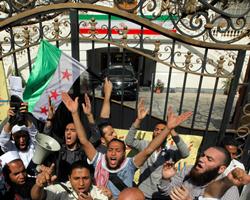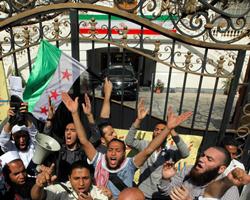 CAIRO (AP) -- A group of hardline Islamists angered by the Egyptian government's push to improve ties with Tehran threw rocks and tried to storm the residence of Iran's top diplomat in Cairo on Friday.
CAIRO (AP) -- A group of hardline Islamists angered by the Egyptian government's push to improve ties with Tehran threw rocks and tried to storm the residence of Iran's top diplomat in Cairo on Friday.Although only about 40 people took part in the demonstration, it underscored deep suspicions many Egyptians have toward their country's rapprochement with Iran.
The rally was sparked by the visit earlier this week of a group of Iranian tourists who arrived in Egypt on the first commercial flights between the two countries in 30 years.
The Iranian tourists were only allowed to visit certain sites, such as ancient Egyptian temples and tombs in the country's south. They did not visit Cairo after objections by some ultraconservative Sunni Muslims to visitors from Shiite Iran. There were also concerns that Iranian visits to Shiite shrines in the Egyptian capital could spark violence.
Friday's protesters were mostly ultraconservative Salafis who consider Shiite Muslims heretics. Some Salafis accuse Iran of trying to spread its practices among Sunni Muslims.
The crowd gathered outside the Iranian diplomat's residence, chanting "Egypt is Sunni," and "No Shiites in Egypt!"
Many of the protesters, who had the traditional beards of Salafi hardliners, raised their shoes in the air - a sign of disrespect in the region - and tore down the official sign outside the building's gate, then stomped on it.
Some of the protesters threw rocks that smashed a window of the building. Others hung a green-striped Syrian rebel flag on the gate and chanted against Tehran's support of Syrian President Bashar Assad's regime and the killing of mostly Sunni anti-government protesters in Syria.
After someone from inside the gate pulled down the flag, some in the crowd tried to storm the diplomat's residence but Egyptian riot police pushed them back.
Iran and Egypt do not have embassies or ambassadors in one another's countries but do have diplomatic representatives. Full diplomatic ties were frozen after Egypt signed its 1979 peace treaty with Israel and Iran underwent its Islamic Revolution.
One of the protesters, Yasser Sami, said he blames Egyptian President Mohammed Morsi for attempts to improve ties with Iran. Dressed in T-shirt and jeans, he said he had a message for Morsi.
"When we elected you, it was for Islamic Shariah, not to get Shiites in Egypt," he said in a reference to Morsi's Islamist platform.
Morsi's predecessor, Hosni Mubark, was ousted in a popular uprising two years ago that paved the way for the country's first free presidential election last summer.
Shortly after his June election, Morsi broke barriers by visiting Tehran, marking the first visit by an Egyptian leader in more than three decades. Months later, Iranian President Mahmoud Ahmadinejad visited Cairo to attend a conference of Islamic nations.
By The Associated Press
The Iran Project is not responsible for the content of quoted articles.











